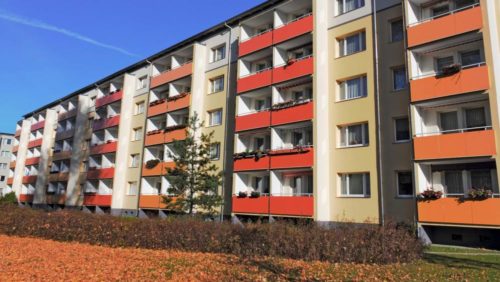International Tenants’ Day 3 October 2022
Tenants, who represent almost 30% of the households in the OECD area (23.1 % in the private rental market and 5.7 % in social rent[4]) are therefore at the forefront of the housing and energy crises.
The IUT asks the governments to decide and implement a plan for the protection of tenants around seven objectives:
- Insert a price cap for energy household consumption.
- No energy cut-offs for households financially overburdened by increased energy costs.
- Moratoria on evictions against tenants who have fallen behind with their payments.
- Develop a policy of rent stabilisation and controls to prevent the indexation of rents in the face of inflation driving up rents and limit rent increases, especially in the private rental sector.
- Long-term compensation for increases in energy costs by governments for low- and middle-income households (climate housing allowances) by using national public funding, which can be complemented by International Green Funds and the EU Social Climate Fund.
- Develop an energy renovation policy which does not negatively affect tenants and does not lead to ”renovictions” (no evictions by renovation and displacement of residents).
- Ensure the maximum level of institutional tenants´participation and democracy, at level playing field with the landlords and housing providers.
IUT calls for a strong commitment from the goverments and the institutions to prevent housing costs like rents and energy cost rising further.
With the amended proposal for a new Energy Efficiency Directive, the European Parliament incorporates several of IUT’s priority claims, but they still must be accepted by the governments represented in the EU Council:
- The principle of housing cost neutrality will be applicable on social housing in case renovations would lead to rent increases or not be cost neutral – meaning that renovation costs should no longer be passed on to tenants: ”Member States may exempt social housing from the obligation to renovate 3 % of the total floor area if the renovations are not cost-neutral or would lead to rent increases for people living in social housing that cannot be limited to the equivalent of the economic savings on the energy bill in any way”.
- Better attention to the risks of cost increases following energy efficiency measures, but also to ensure protection of the energy poor, low-income, vulnerable customers as well as indivudals living in social housing from unfair prices and unjustified price increases.
- Governments should guarantee that energy efficiency measures do not disproportionately increase the cost of these services or lead to greater social exclusion or displacement of residents after renovation.
- Energy poverty is better defined and mentions comfort and health, decent standards of living and its causes: insufficient disposable income, high energy expenditures and poor energy efficiency of homes. Assurance that energy poor, low-income or vulnerable groups would not suffer from energy measures with direct or indirect impact on such groups.
- Call on parties to engage with civil society organizations like tenant unions, in the form of a platform dedicated to energy poverty alleviation, as well as the establishment of energy efficiency partnerships.
- Increased level of transparency as relates to applicable tariffs and prices, standard terms and conditions in respect of access to and use of heating, cooling, and domestic hot water services.
- The access to affordable bank loans or credit lines, as well as the establishment of a dedicated energy efficiency financial instrument, must be ensured.
IUT President Marie Linder: On the occasion of International Tenants Day, we call on governments taking their responsibility to protect vulnerable households affected by rent and energy arrears caused by inflation and energy price explosions. The new legislation is a step in the right direction.
But we need more: Governments should implement a cap on energy prices. Governments must implement moratoria on evictions and as well a cap on rent prices.
The war on Ukraine and the energy crises should not hit one of the most basic needs of human beings- the need for a safe and sound home.
Tenants in the whole world are united in their fight against housing exclusion and homelessness and to make housing decent and affordable for all.
*** More info: info@iut.nu ***
[1] OECD, figure HC1.1.3
[2] https://data.oecd.org/…
[3] Statistics | Eurostat (europa.eu)
[4] Affordable Housing | Compare your country
Deutscher Mieterbund e.V.
Littenstraße 10
10179 Berlin
Telefon: +49 (30) 22323-0
Telefax: +49 (30) 22323-100
http://www.mieterbund.de/
![]()



